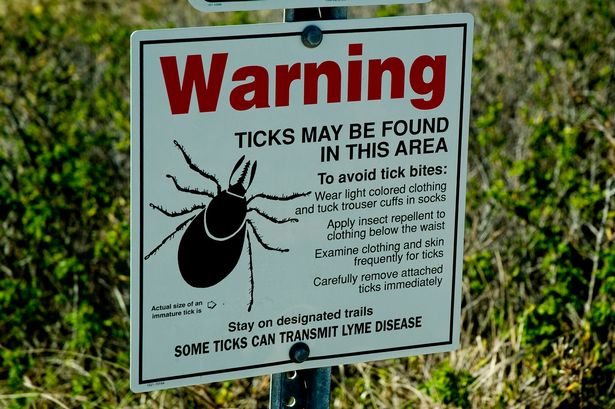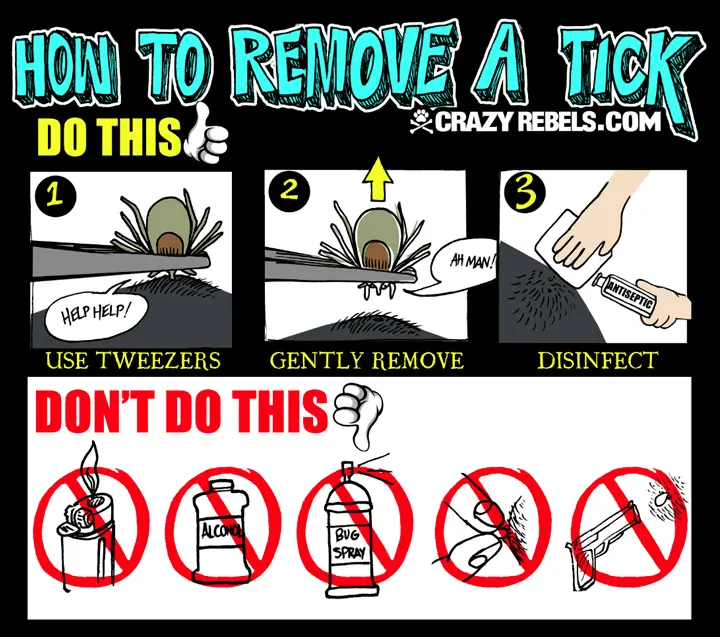(the original post can be found at KristenGross.com so that the intro lines)
Please join us in welcoming a guest author to the blog! If you ride in North County San Diego, you have probably met Dee Folse–he is one of the friendliest, warmest (and coolest!) riders we’ve met, so when he asked us to help him help a friend, we were all about it.
Dee’s friend would like to remain anonymous, which I think is appropriate. Because given the topic we’re about to discuss, Dee’s friend could literally be any of us.
This friend was recently dealt a crummy hand: an encounter with a tiny bug while out mountain biking in North County has turned the last 15 months into a living hell. Only recently—after almost a year of wondering if it was MS, Chronic Fatigue Syndrome, Dementia, Rheumatoid Arthritis, Crazy, You Name It—were doctors able to help Dee’s friend understand what had happened.
Now, they are able to get the treatment needed to stave off the intense fatigue, clear their head and eyesight, and be able to pursue a normal-ish life where you can make plans like going out to ride your bike…or even go to work. Chronic Lyme Disease, delivered by the bite of an infected tick, is on the rise, and anyone who plays outside is at risk.
The worst part is that getting treatment is far from cut and dry. In fact, the reason Dee’s friend has asked to remain anonymous is because until the CDC properly recognizes Chronic Lyme Disease, there is technically not an approved protocol for treatment. As I understand it, that means doctors who take care of you through this debilitating disease are at risk of professional repercussions.
As an example, if you went to the doctor with strep throat, and your doctor prescribed chemotherapy to treat it, that is obviously against the protocol for strep throat, and that doctor could be reprimanded—even lose their license. With no approved protocol, or even the acknowledgement of Chronic Lyme Disease, any treatment of Chronic Lyme Disease or its symptoms with antibiotics or other therapies is against protocol. To add insult to injury, insurance companies are likely to deny the funding of these treatments. Thus, there is only a shadowy path available for those who need help to get out the other side. Please take the time to read Dee’s post below, and help us spread the word so we don’t have to watch any more of our friends get sick:
By Dee Folse: In the last 15 months I have come to know more about Lyme disease then I ever wanted to know. What I can definitively say is, tick-borne diseases are on an incredible rise. The CDC reports that in 2013, there were 30,000 cases reported. In 2014 the number of tick-borne illnesses including Lyme disease, has exploded to 300,000 cases.
I’ve also discovered that this is not a disease that is limited to certain corners of the United States. In fact, it is spreading down the eastern seaboard, across the Gulf and straight up the west coast through California, Oregon, Washington, and parts of Canada.
Despite the alarming increase in tick-borne illness, discovering a tick on you is not necessarily a bad thing. However, if you suspect it has been there for longer than six hours, and it has attached or become engorged, that’s where there is a potential problem.
If you find an attached tick, the first thing to do is take a picture of it, and save it if possible. Second, Google “tick removal,” and become familiar with the many options there are to choose from.
Within the next three-to-six weeks, if you start to experience symptoms such as dizziness, fatigue, cognitive failure, blurred vision, fever, chills, and/or muscle aches, see an immunologist immediately. An immunologist will be able to take the proper blood test and do a proper analysis to find out if in fact you’re carrying a tick-borne bacteria. This doctor should be a “Lyme Literate Doctor.” I know several—I can help.
It’s also important to know there is a difference between Acute Lyme Disease and Chronic Lyme Disease. Chronic Lyme Disease is the one that can easily be misunderstood. It can hide for years, then present when the body is stressed. Oftentimes pregnancy, divorce, death or stress can allow Chronic Lyme to take hold.
In my community, we live in the outdoors, hike on the trails and ride bikes. Lyme disease is out there, and it’s a very serious thing. We’re becoming more aware, but there is still a long way for us to go to catch up to the growing number of cases. I urge you to learn more by reading about it online, joining Facebook groups devoted to Lyme disease awareness and support, or you can call me and I can direct you to some videos, and some suggestions for Lyme Literate Doctors.
Even if you don’t remember being bit by a tick, or you never experience the famous “bulls-eye” rash, if something feels off, and you’re having those symptoms, pay attention to your body and seek out an immunologist. Trust yourself, and push on even if your doctor says, “You look great there’s nothing wrong with you;” or “If there is something wrong with you, it’s out of my area of expertise;” or my personal favorite: “Try to exercise more and eat right.”
Please feel free to reach out to me anytime; I would hate to see anyone go through what my friend has gone through.
I’m certainly not trying to spread panic—just awareness. I’m here to help.
More on Lyme Disease and Ticks:
http://pontiactribune.com/chronic-lyme-disease-new-era-ignorance/
http://www.bicycling.com/training/health-injuries/could-you-have-lyme-disease-and-not-even-know-it
http://www.bicycling.com/training/health-tips/keep-ticks-away-these-tips
http://www.outsideonline.com/1915071/rise-tick
About The Author: Kris Gross is a freelance writer, contributor to MTBR and TGR, and Pro-Cat Canuck in Cali. You may see me out training, racing and volunteering with Team Ninja or coaching with Ninja Mountain Bike Skills. Thank you for reading!




